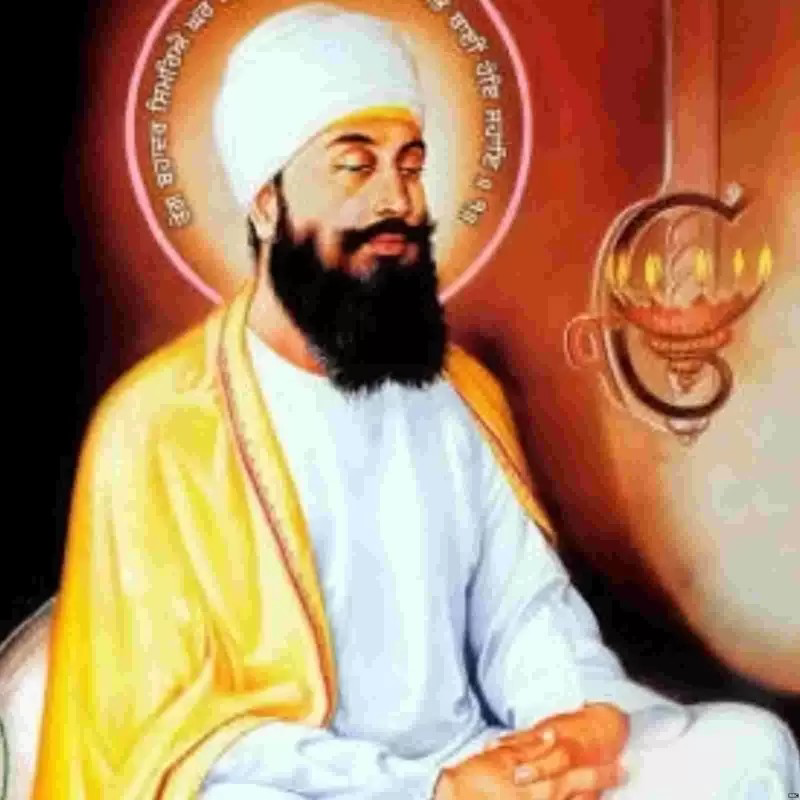Addressing Emperor Aurangzeb, Guru Tegh Bahadur said, 'I am not a Hindu, I do not believe in the supremacy of the Vedas, worship of idols and other rituals, but I respect the Hindu religion and its religious beliefs and I will live with them in a good manner. I will continue to fight for my rights.
But these words of Guru Tegh Bahadur had no effect on Mughal emperor Aurangzeb. Many scholars in Aurangzeb's court told him that the Guru's growing influence could be a threat to Islam. At one point, Aurangzeb had decided to execute Guru Tegh Bahadur, but one of his Rajput ministers, Raja Ram Singh, pleaded to let him live, which Aurangzeb accepted. A month later, in December, all charges against Guru Tegh Bahadur were withdrawn and he was released. As soon as he was released, he resumed his journey eastward and reached Patna via Mathura, Agra, Kanpur, Allahabad, Varanasi, and Bodh Gaya. Guru Tegh Bahadur's wife Mata Gujri decided to stay there but Guru Tegh Bahadur left for Dhaka to meet his followers. While in Dhaka, he received news that a son was born to him, who was named Gobind Rai, who later became known as Guru Gobind Singh in Sikhism.
Meanwhile, Emperor Aurangzeb entrusted Raja Ram Singh with the responsibility of crushing the rebellion of the King of Kamrup. In those days, Kamrup was considered dangerous, famous for its brave warriors and 'black magic.
Raja Ram Singh had complete faith in the spiritual power of Guru Tegh Bahadur. Raja Ram Singh requested Guru Tegh Bahadur to accompany him in his campaign to Kamrup. The Guru could not refuse his request.
Sarbpreet Singh writes that the Guru spent about three years in Assam during the war, during which he sometimes played the role of mediator. On his return, he could not meet his wife in Patna as he was receiving constant messages that she was needed in Punjab. He returned to the Chak Nanki throne in March 1672. His journey took him to places no other Sikh Guru except Guru Nanak had visited.
Pandits of Kashmir
On 25 May 1675, when Guru Tegh Bahadur was sitting in a Sangat Anandpur Sahib, a group of people from Kashmir came to meet him. This group was led by Pandit Karpa Ram Beech. He folded his hands and told the Guru that the religion of his ancestors, which has been practiced for thousands of years, is in danger.
The governor of Kashmir, Iftikhar Khan, representing Emperor Aurangzeb, ordered them to convert to Islam or else they will be put to death.
Guru Tegh Bahadur did not immediately respond to Kripa Ram's request but was heartbroken to hear about his suffering. In his biography of Guru Tegh Bahadur, Hari Ram Gupta writes that the Guru asked the Brahmins of Kashmir to tell the Emperor's representatives that if Guru Tegh Bahadur accepted Islam, he would also change his religion.
Hari Ram Gupta writes that 'Aurangzeb objected to the fact that all the Sikhs called the Guru the 'true king'. Aurangzeb took this to mean that the Guru wanted to propagate that he was the true emperor and that the ruler of India was a fake emperor.
Aurangzeb was also reluctant to use 'Bahadur' with the Guru's name as it was a title given to dignitaries in the Mughal court.
Mughal emperor Aurangzeb ordered that Guru Tegh Bahadur be brought before him in Delhi and forced to convert to Islam or face death.
Questions and answers from Guru Tegh Bahadur
After receiving this order from the Mughal Emperor, Guru Tegh Bahadur bade farewell to his family and companions and announced that his son Gobind Rai would succeed him as the next Guru. On 11 July 1675, Guru Tegh Bahadur left for Delhi along with his five followers Bhai Matidas, his younger brother Sati Das, Bhai Dayala, Bhai Jeeta, and Bhai Uday.
After walking a short distance, he sent Bhai Uday and Bhai Jeeta to Delhi to get more news.
A day later, he was arrested by Hakim Mirza Noor Muhammad Khan of Ropar police station in village Rangharan in Malikpur. From Ropar, the Guru and his three companions were taken to Sirhind under heavy guard. After that, he was sent to Delhi's Chandni Chowk police station.
During these four months of imprisonment, the Guru and his three companions were subjected to great torture.
Guru Tegh Bahadur's biographer Harbans Singh Virdi writes in his book 'Guru Tegh Bahadur, the Savior of Hindus and India' that 'in Delhi, the Guru was taken to the Red Fort along with his three companions. Many questions were asked of the Guru about Hinduism and Sikhism. He was also asked why he sacrificed his life for those who wear the sacred thread and get a tattoo on the forehead.
The Guru's reply was that the Hindus had become weak and had therefore come to seek refuge in Nanak's court. If the Muslims had also sought their help in this way, they too would have sacrificed their lives for them
Mughal emperor Aurangzeb's warning
Dr. Terlochan Singh in his book 'Guru Tegh Bahadur Prophet and Shaheed' writes that 'Aurangzeb entered the Diwan Aam at nine in the morning and reached his balcony. He was dressed in white silk. A jeweled dagger was tied around his waist. He had a white turban on his head. Eunuchs stood on either side of the emperor, fanning him with fans made of yak tails and peacock feathers. were giving
The emperor already knew about Sikhism. He also knew that Sikhs were against idolatry like Muslims. He had high hopes of persuading the Guru to convert to Islam because of the ideological affinity between the two religions.
King Aurangzeb said to Guru Tegh Bahadur you neither believe in idolatry nor believe in these Brahmins, so why have you come before us with their case?
Guru Tegh Bahadur Shahshana failed to satisfy and convince Aurangzeb. In the end, he was clearly told by the court that he should accept Islam or be ready to die. Guru Tegh Bahadur was put in an iron cage and chained.
Emperor Aurangzeb sent several messengers to Guru Tegh Bahadur but the Guru remained steadfast. One day the head of the jail said to the master that the king wants him to accept Islam. If it is not possible for you to do this, perform a miracle so that they will know that you are a holy man.
Harbans Singh Virdi writes 'The Guru replied, My friend, miracles mean the grace and favor of God. He does not allow magic to be shown to the world. If his grace is misused, he will be angry. It does not need to be displayed. Because everyday miracles are happening in front of us. Isn't it a miracle that the emperor is giving death sentences to others but he has no idea that one day he too has to die.?














No comments:
Post a Comment